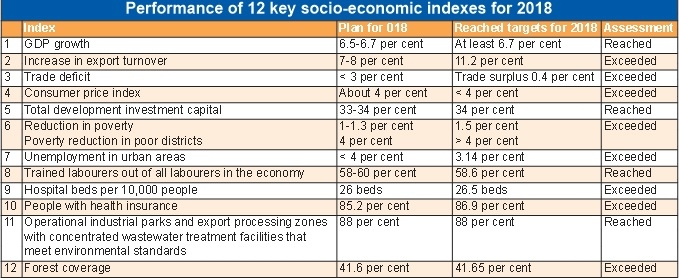Economic growth targets eclipsed on eight counts
 |
| The NA reported that Vietnam will fulfil all of its goals for the five-year c development plan for 2016-2020 |
 |
Prime Minister Nguyen Xuan Phuc last week reported to the National Assembly (NA) that the domestic economy will in 2018 “reach and exceed all 12 key socioeconomic goals” (see box for details), creating an important foundation for the country to continue to reach even higher in 2019 and beyond.
“The size of the economy has increased 1.3 times within 2016-2018, with per capita GDP climbing by $440, and people’s lives have improved accordingly. It is forecast that we will fulfil all goals for the five-year socioeconomic development plan 2016-2020 set by the Party and the NA,” he stressed. “With Vietnam’s great network of free trade agreements and optimistic forecasts in growth of the US, China, and the EU, there will be a rise in global demands for Vietnamese goods.”
According to the NA Economic Committee, the Vietnamese economy will continue to benefit from the positive impact of the continued economic situation globally, with the country’s trade and foreign direct investment (FDI) remaining at high levels.
“After three years of implementing the socioeconomic development plan for 2016-2020 period, the economy remains strong in its growth trajectory, with big improvements in growth quality and pace,” said the committee’s chairman Vu Hong Thanh.
Specifically, economic growth increased from 6.21 per cent in 2016 to 6.81 per cent last year, and is expected to rise by at least 6.7 per cent this year. The average rate sat at 6.57 per cent in 2016-2018, higher than the 5.91 per cent growth in 2011-2015.
The economy’s size has also expanded. It hit $205.3 billion in 2016, $223.7 billion in 2017, and is expected to reach $240.5 billion this year, 1.33 times higher than in 2015, according to the committee.
The World Bank and the Asian Development Bank have highly valued Vietnam’s economic achievements.
“The Vietnamese economy continues to perform well, propelled by sustained global recovery and continued domestic reforms. Robust growth is boosting job creation and income growth, leading to broad-based welfare gains and poverty reduction,” said the World Bank in its latest report on Vietnam’s economic outlook.
The country’s medium-term projections have improved further. According to the report, real GDP is now predicted to expand by 6.8 per cent this year, up from 6.5 per cent in previous projections. It will then moderate to 6.6 per cent in 2019 and 6.5 per cent in 2020, mainly due to the envisaged cyclical moderation of global demand.
The Asian Development Bank (ADB) has also forecast Vietnam’s economic growth at 6.9 per cent for 2018, slightly lower than the 7.1 per cent projected in April as exports, agriculture, construction, and mining are expected to moderate in the second half of the year. The ADB retains its 2019 growth forecast for Vietnam at 6.8 per cent.
The ADB last week released its Asian Economic Integration Report 2018 stating that Vietnam is the seventh largest FDI recipient in Asia, at $14.1 billion in 2017. Only China, Hong Kong, Singapore, Australia, India, Indonesia, and South Korea sit ahead of the country in the table.
What the stars mean:
★ Poor ★ ★ Promising ★★★ Good ★★★★ Very good ★★★★★ Exceptional
 Tag:
Tag:
Related Contents
Latest News
More News
- NAB Innovation Centre underscores Vietnam’s appeal for tech investment (January 30, 2026 | 11:16)
- Vietnam moves towards market-based fuel management with E10 rollout (January 30, 2026 | 11:10)
- Vietnam startup funding enters a period of capital reset (January 30, 2026 | 11:06)
- Vietnam strengthens public debt management with World Bank and IMF (January 30, 2026 | 11:00)
- PM inspects APEC 2027 project progress in An Giang province (January 29, 2026 | 09:00)
- Vietnam among the world’s top 15 trading nations (January 28, 2026 | 17:12)
- Vietnam accelerates preparations for arbitration centre linked to new financial hub (January 28, 2026 | 17:09)
- Vietnam's IPO market on recovery trajectory (January 28, 2026 | 17:04)
- Digital economy takes centre stage in Vietnam’s new growth model (January 28, 2026 | 11:43)
- EU Council president to visit Vietnam amid partnership upgrade (January 28, 2026 | 11:00)






















 Mobile Version
Mobile Version